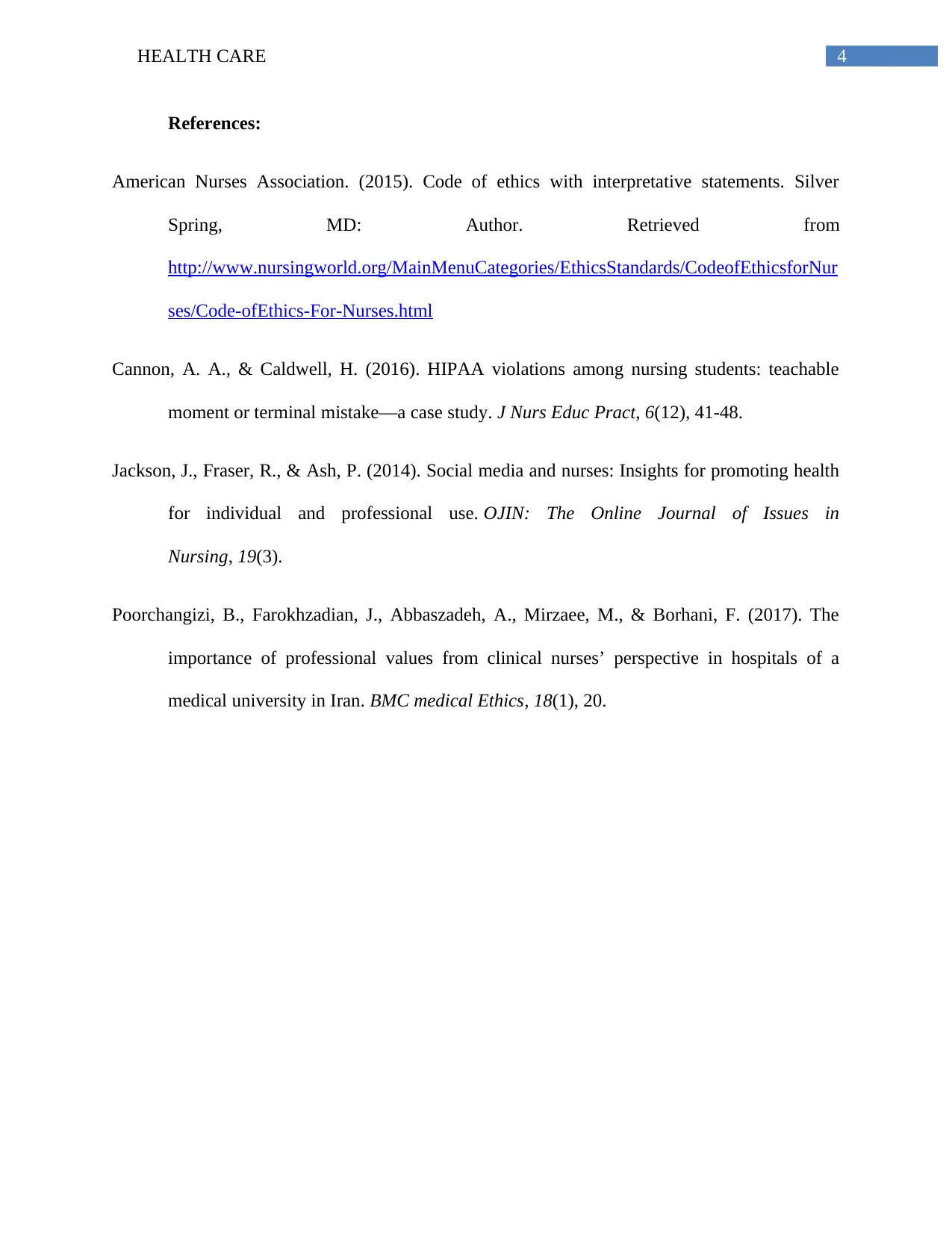Social Media Usage Analysis and Professional Standards in Healthcare
VerifiedAdded on 2022/08/13
|5
|878
|24
Report
AI Summary
This report analyzes the student's social media activity, focusing on potential violations of nursing professional standards. The student identifies a specific instance where they disclosed a patient's name and shared negative comments, violating patient privacy and the American Nurses Association's code of ethics. The report emphasizes the importance of maintaining professional conduct, upholding patient confidentiality, and adhering to HIPAA regulations. It highlights the consequences of violating these standards, including disciplinary actions. The student reflects on their actions, aligning them with Christian values of dignity and respect, and concludes by emphasizing the need for nurses to monitor their social media behavior and consider the implications of their posts, suggesting that they will refrain from discussing patient information on social media in the future.

Running head: HEALTH CARE
Health care
Name of the student:
Name of the University:
Author’s note
Health care
Name of the student:
Name of the University:
Author’s note
Paraphrase This Document
Need a fresh take? Get an instant paraphrase of this document with our AI Paraphraser

1HEALTH CARE
Introduction:
Social media is now an important part of people’s life and it represents a space for
connection, feelings, sharing information and receiving feedback from others. Although it aids
process of education and information sharing, nurses have many professional obligations while
using social media. Violation of these obligations often leads to legal and ethical consequences
(Jackson, Fraser & Ash, 2014). This paper will provide analysis of my social media usage and
any inappropriate actions that could violate professionals standards of nursing.
Assessment of social media activity:
Based on the review of my social media activities, I found that I discussed about my
professional nursing role many times. I acknowledged some of my work achievements and also
expressed my feelings when I had a difficult time dealing with a patient. On close scrutiny of
those posts, one inappropriate action that I identified was that I disclosed the name of the client
in the post and expressed what a difficult time this patient gave me. I think this action was
inappropriate because according to the America Nurse Association’s nursing code of conduct,
nurses have the responsibility not to share patient information on social media and show respect
to patient in the physical space where they are receiving care (American Nurses Association,
2015). However, by taking the name of patient and giving comment on the patient, I violated this
standard and patient’s privacy rights too. According to Adib-Hajbaghery and Faraji (2016),
violation of patient’s privacy is a serious concern as it violates professional standards and may
lead to termination or violation too.
Introduction:
Social media is now an important part of people’s life and it represents a space for
connection, feelings, sharing information and receiving feedback from others. Although it aids
process of education and information sharing, nurses have many professional obligations while
using social media. Violation of these obligations often leads to legal and ethical consequences
(Jackson, Fraser & Ash, 2014). This paper will provide analysis of my social media usage and
any inappropriate actions that could violate professionals standards of nursing.
Assessment of social media activity:
Based on the review of my social media activities, I found that I discussed about my
professional nursing role many times. I acknowledged some of my work achievements and also
expressed my feelings when I had a difficult time dealing with a patient. On close scrutiny of
those posts, one inappropriate action that I identified was that I disclosed the name of the client
in the post and expressed what a difficult time this patient gave me. I think this action was
inappropriate because according to the America Nurse Association’s nursing code of conduct,
nurses have the responsibility not to share patient information on social media and show respect
to patient in the physical space where they are receiving care (American Nurses Association,
2015). However, by taking the name of patient and giving comment on the patient, I violated this
standard and patient’s privacy rights too. According to Adib-Hajbaghery and Faraji (2016),
violation of patient’s privacy is a serious concern as it violates professional standards and may
lead to termination or violation too.

2HEALTH CARE
Nursing responsibility to uphold standard of conduct:
It is important for all nurses to maintain certain professional conduct that is consistent
with standards of practice. This is important to avoid conflict of interest, unnecessary
disciplinary actions and implement care in consistent with relevant professional standards and
existing Acts or law. For example, According to Poorchangizi et al. (2017), personal behavior of
nurse be a reason for the violation of the HIPAA (The Health Insurance Portability and
Accountability Act of 1996) if they disclose confidential information of patient to the public
either verbally or through social media sites and fail to manage confidentiality and integrity of
data. This may lead to suspension of the nurses (Cannon & Caldwell, 2016). Thus, the main
purpose of professional nursing standards is to direct nurse to safe and competent nursing
practice. It enables nurse to engage in safe nursing care, protect patients rights and effectively
deal with ethical issues in care (Poorchangizi et al., 2017). In brief, it can be said that nurse’s
personal and professional behavior is crucial to resolve key problems in nursing profession and
maintain the integrity of the organization.
One of my social activities that relates to Christian values of dignity and respecting
human value is my act of ensuring that I do not post any inappropriate pictures of patient in
social media. Though I shared my reactions to a patient care issue, however I never share their
pictures as I feel that patient body parts are often exposed and displaying this may cause
disrespect and violate their dignity. However, as I failed to maintain privacy of patient during my
social media activity, I have planned never to discuss anything about patient or my work at social
media sites. I would rather discuss this with my colleagues instead of posting messages on social
media.
Nursing responsibility to uphold standard of conduct:
It is important for all nurses to maintain certain professional conduct that is consistent
with standards of practice. This is important to avoid conflict of interest, unnecessary
disciplinary actions and implement care in consistent with relevant professional standards and
existing Acts or law. For example, According to Poorchangizi et al. (2017), personal behavior of
nurse be a reason for the violation of the HIPAA (The Health Insurance Portability and
Accountability Act of 1996) if they disclose confidential information of patient to the public
either verbally or through social media sites and fail to manage confidentiality and integrity of
data. This may lead to suspension of the nurses (Cannon & Caldwell, 2016). Thus, the main
purpose of professional nursing standards is to direct nurse to safe and competent nursing
practice. It enables nurse to engage in safe nursing care, protect patients rights and effectively
deal with ethical issues in care (Poorchangizi et al., 2017). In brief, it can be said that nurse’s
personal and professional behavior is crucial to resolve key problems in nursing profession and
maintain the integrity of the organization.
One of my social activities that relates to Christian values of dignity and respecting
human value is my act of ensuring that I do not post any inappropriate pictures of patient in
social media. Though I shared my reactions to a patient care issue, however I never share their
pictures as I feel that patient body parts are often exposed and displaying this may cause
disrespect and violate their dignity. However, as I failed to maintain privacy of patient during my
social media activity, I have planned never to discuss anything about patient or my work at social
media sites. I would rather discuss this with my colleagues instead of posting messages on social
media.
⊘ This is a preview!⊘
Do you want full access?
Subscribe today to unlock all pages.

Trusted by 1+ million students worldwide

3HEALTH CARE
Conclusion:
Based on the above analysis, it can be concluded that social media often lead to
unprofessional behavior and it is important for nurse to monitor their actions and consider the
consequences of their social media activity by regularly reviewing professional’s standards and
code of practice.
Conclusion:
Based on the above analysis, it can be concluded that social media often lead to
unprofessional behavior and it is important for nurse to monitor their actions and consider the
consequences of their social media activity by regularly reviewing professional’s standards and
code of practice.
Paraphrase This Document
Need a fresh take? Get an instant paraphrase of this document with our AI Paraphraser

4HEALTH CARE
References:
American Nurses Association. (2015). Code of ethics with interpretative statements. Silver
Spring, MD: Author. Retrieved from
http://www.nursingworld.org/MainMenuCategories/EthicsStandards/CodeofEthicsforNur
ses/Code-ofEthics-For-Nurses.html
Cannon, A. A., & Caldwell, H. (2016). HIPAA violations among nursing students: teachable
moment or terminal mistake—a case study. J Nurs Educ Pract, 6(12), 41-48.
Jackson, J., Fraser, R., & Ash, P. (2014). Social media and nurses: Insights for promoting health
for individual and professional use. OJIN: The Online Journal of Issues in
Nursing, 19(3).
Poorchangizi, B., Farokhzadian, J., Abbaszadeh, A., Mirzaee, M., & Borhani, F. (2017). The
importance of professional values from clinical nurses’ perspective in hospitals of a
medical university in Iran. BMC medical Ethics, 18(1), 20.
References:
American Nurses Association. (2015). Code of ethics with interpretative statements. Silver
Spring, MD: Author. Retrieved from
http://www.nursingworld.org/MainMenuCategories/EthicsStandards/CodeofEthicsforNur
ses/Code-ofEthics-For-Nurses.html
Cannon, A. A., & Caldwell, H. (2016). HIPAA violations among nursing students: teachable
moment or terminal mistake—a case study. J Nurs Educ Pract, 6(12), 41-48.
Jackson, J., Fraser, R., & Ash, P. (2014). Social media and nurses: Insights for promoting health
for individual and professional use. OJIN: The Online Journal of Issues in
Nursing, 19(3).
Poorchangizi, B., Farokhzadian, J., Abbaszadeh, A., Mirzaee, M., & Borhani, F. (2017). The
importance of professional values from clinical nurses’ perspective in hospitals of a
medical university in Iran. BMC medical Ethics, 18(1), 20.
1 out of 5
Related Documents
Your All-in-One AI-Powered Toolkit for Academic Success.
+13062052269
info@desklib.com
Available 24*7 on WhatsApp / Email
![[object Object]](/_next/static/media/star-bottom.7253800d.svg)
Unlock your academic potential
Copyright © 2020–2026 A2Z Services. All Rights Reserved. Developed and managed by ZUCOL.





